Unit 4 Don’t talk here. 课件(33张PPT,内嵌音频)
文档属性
| 名称 | Unit 4 Don’t talk here. 课件(33张PPT,内嵌音频) | 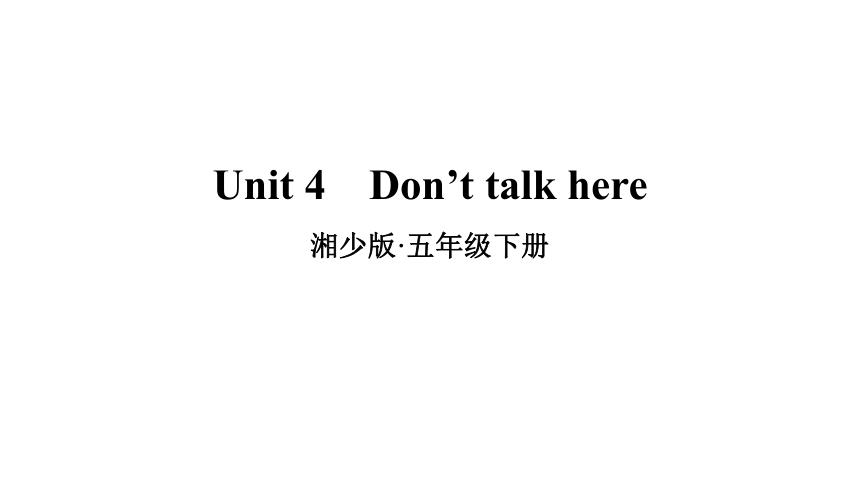 | |
| 格式 | zip | ||
| 文件大小 | 10.9MB | ||
| 资源类型 | 教案 | ||
| 版本资源 | 湘少版 | ||
| 科目 | 英语 | ||
| 更新时间 | 2020-06-02 18:38:27 | ||
图片预览

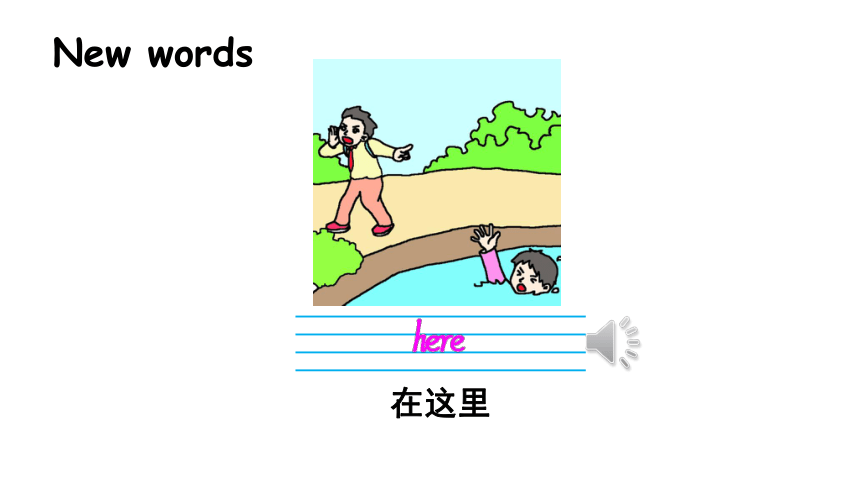
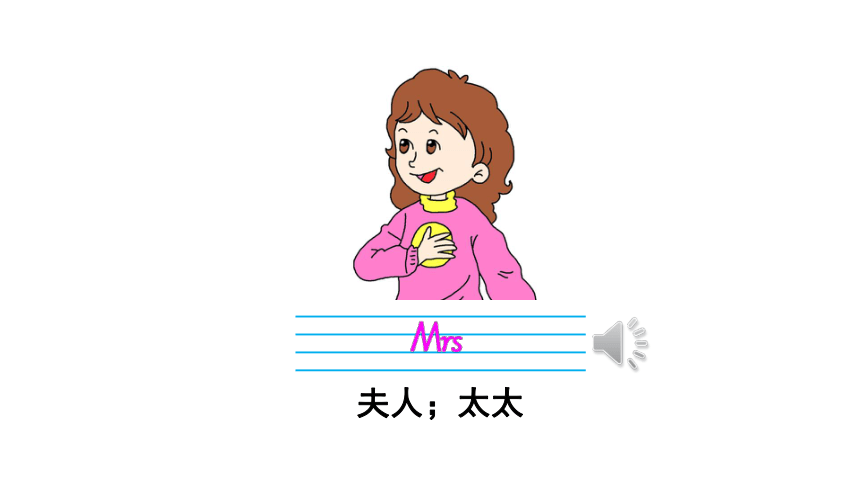
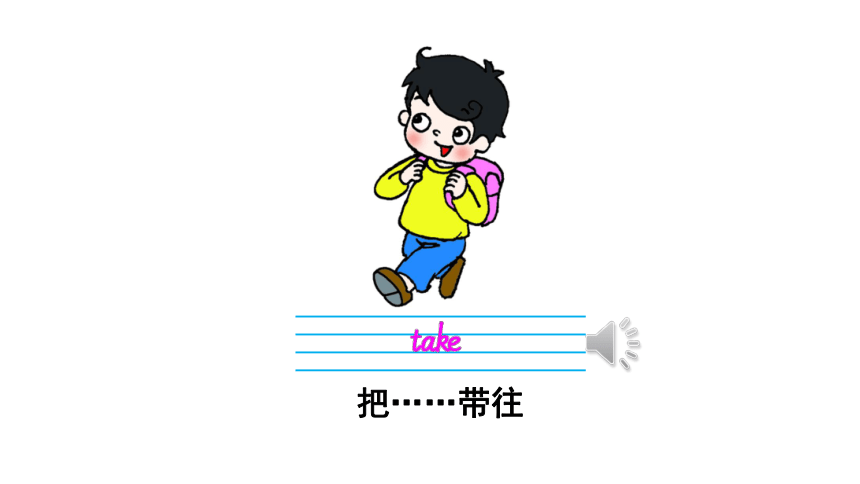
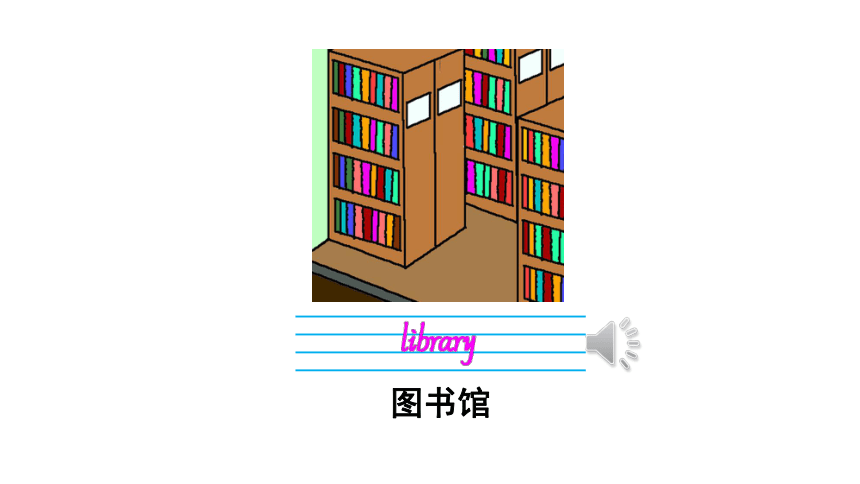
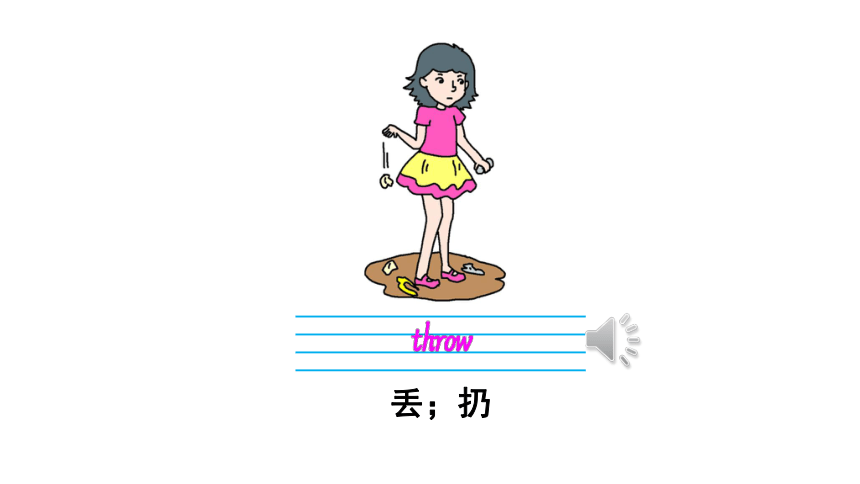
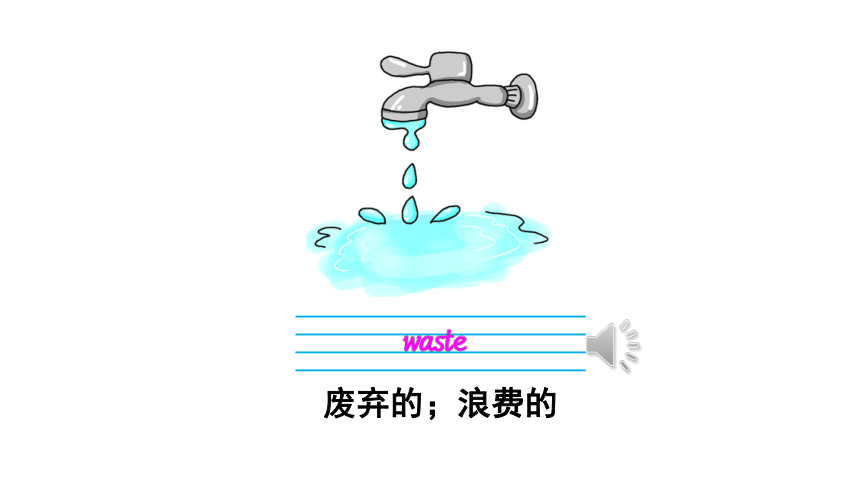
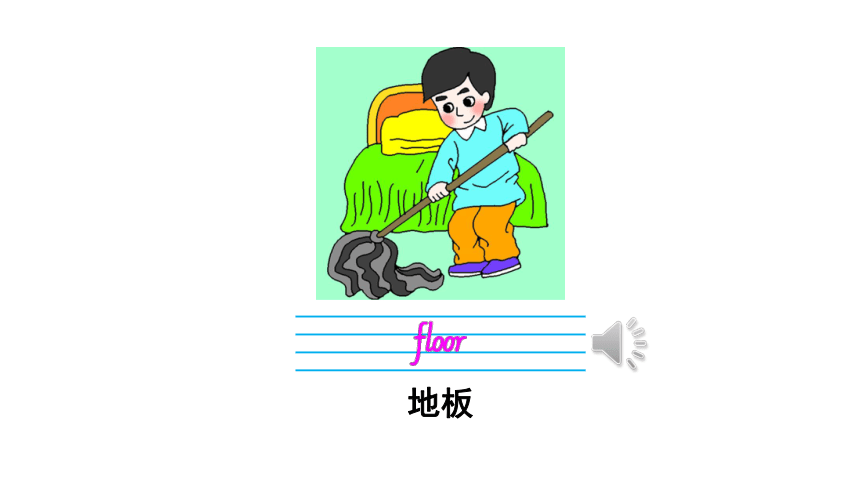
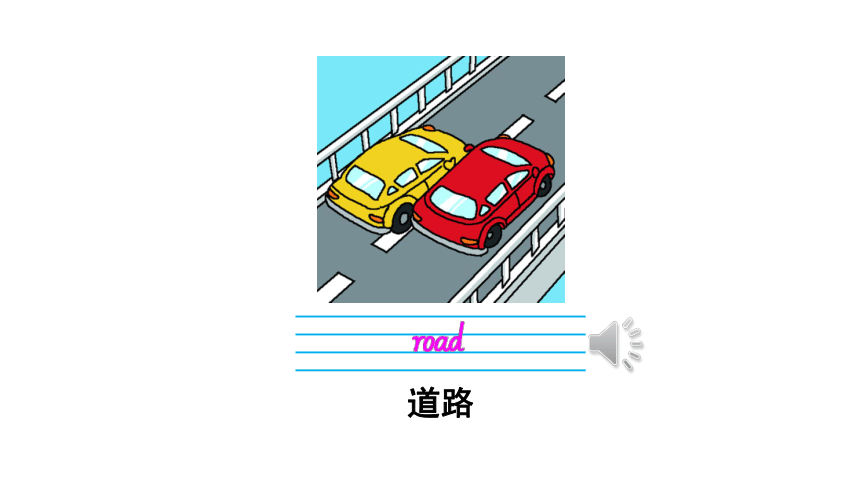
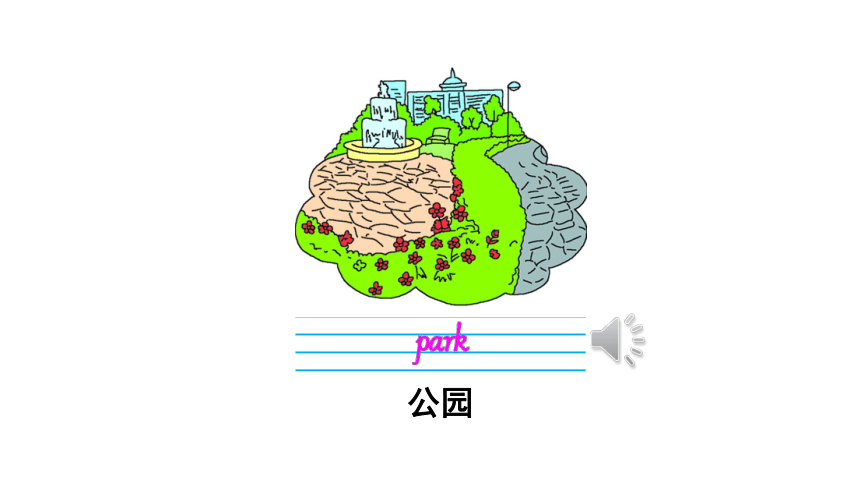
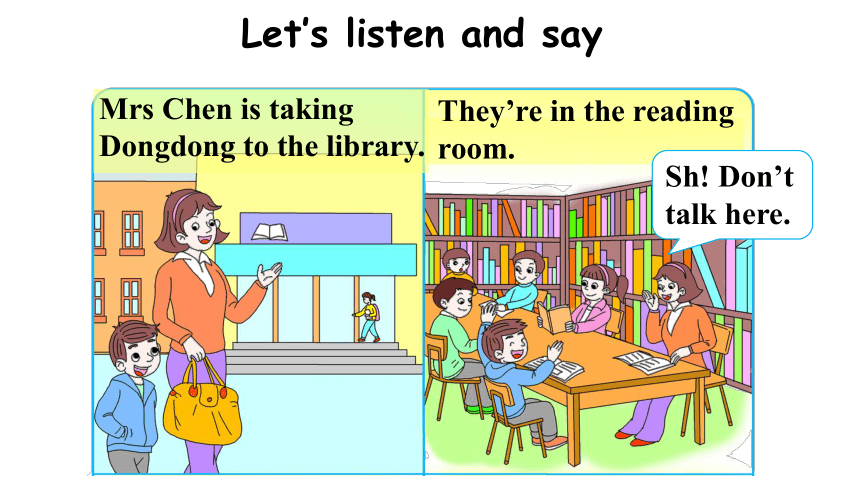
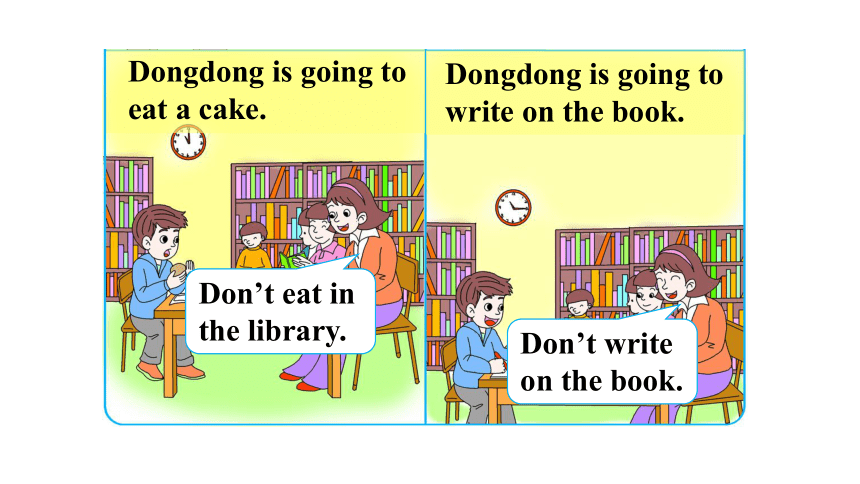
文档简介
(共33张PPT)
Unit
4
Don’t
talk
here
湘少版·五年级下册
在这里
New
words
夫人;太太
把……带往
图书馆
丢;扔
废弃的;浪费的
地板
道路
公园
Sh!
Don’t
talk
here.
Mrs
Chen
is
taking
Dongdong
to
the
library.
They’re
in
the
reading
room.
Let’s
listen
and
say
Dongdong
is
going
to
eat
a
cake.
Don’t
eat
in
the
library.
Dongdong
is
going
to
write
on
the
book.
Don’t
write
on
the
book.
Language
points
1.
Mrs
Chen
is
taking
Dongdong
to
the
library.
陈夫人正带着东东去图书馆。
to
表示“到”的意思,强调所移动的目的地。
take…to….
带……去……
常用句型:take
sb.
to
sp
带某人到某地
例如:我妈妈经常带我去公园。
My
mother
often
takes
me
to
the
park.
2.
Don’t
talk
here.
不要在这里说话。
这是祈使句的否定形式。
否定形式:一般在动词前加don’t
。无动词的祈使句的否定形式是在祈使句的句首加not。
例句:不要开门。
Don’t
open
the
door.
注意:
在肯定的祈使句中,为表示委婉或礼貌,
一般在句子前或后加please。
定义:
表示命令、要求、请求或劝告语气的句子。
句型结构:在祈使句中,
动词原形放于句首。祈使句
中一般不出现主语。
回答:
一般可以用“All
right./
OK.”
祈使句
(1)不要在阅览室讲话。
____________
in
the
reading
room.
(2)不要在公交车上吃东西。
___________
on
the
bus.
(3)不要在课堂上听音乐。
_____________________
in
class.
Don’t
talk
Don’t
eat
Don’t
listen
to
music
Let’s
learn
Don’t
talk
in
the
library.
Don’t
eat
in
class.
不要在图书馆说话。
不要在课上吃东西。
Don’t
throw
waste
paper
on
the
floor.
Don’t
draw
on
the
wall.
不要往地板上扔废纸。
不要在墙上乱画。
Don’t
play
football
on
the
road.
Don’t
pick
flowers
in
the
park.
不要在马路上踢足球。
不要在公园摘花。
Let’s
practise
Don’t
talk
in
the
library.
eat
in
class.
Don’t
talk
in
the
library.
Don’t
play
football
on
the
road.
Talk
in
groups
Don’t
pick
flowers
in
the
park.
Don’t
eat
in
class.
Don’t
draw
on
the
wall.
Don’t
throw
waste
paper
on
the
floor.
Let’s
read
Bob
and
Paul
study
in
Sunshine
School.
They
live
in
the
same
room.
They’re
roommates.
Bob
likes
music.
His
favourite
subject
is
music.
He
often
listens
to
music
late
in
the
evening.
Paul
doesn’t
like
that.
Paul
likes
drawing.
He
always
throws
waste
paper
on
the
floor.
Bob
doesn’t
like
that.
Paul
likes
reading.
He
often
reads
in
bed
till
very
late.
Bob
cannot
sleep
well.
Bob
likes
singing.
He
always
sings
loudly.
Paul
cannot
do
his
homework
well.
This
is
really
a
problem!
True
or
false?
1.
Bob
and
Paul
study
in
the
same
school.
2.
Bob
and
Paul
like
music.
3.
Paul
throws
waste
paper
on
the
floor.
Bob
doesn’t
like
that.
4.
Paul
always
sings
loudly.
T
F
T
F
Language
points
1.
He
often
reads
in
bed
till
very
late.
他经常在床上看书到很晚。
till
意为“直到……为止”。
作介词时,后面接名词或副词;用作连词时,常来引导时间状语从句。
例句:他直到六点钟才回家。
He
didn’t
go
home
till
six
o’clock.
2.
This
is
really
a
problem!
这确实是一个大问题!
really
作副词,在句中一般做状语,意思是“确实,的确”。
例句:她真的很喜欢那幅画。
She
really
likes
that
picture.
注意:副词的位置常放于实义动词或情态动词之前,
be动词之后。
Let’s
write
Bob
and
Paul
tell
their
problems
to
the
class.
The
whole
class
talk
about
it.
Their
teacher
says,
“Let’s
make
rules
for
Bob
and
Paul.”
Please
work
in
groups
and
make
rules
for
them.
Don’t
_______________.
Don’t
_______________.
_____________________
_____________________
_____________________
listen
to
music
late
throw
waste
paper
Don’t
read
in
bed
till
late.
Don’t
sing
loudly.
on
the
floor.
Let’s
have
fun
Be
quiet.
Draw
the
signs.
Use
the
bin.
安静。
使用垃圾箱。
Mind
the
steps.
小心台阶。
Don’t
read
in
bed.
不要在床上看书。
Don’t
draw
on
the
wall.
不要在墙上乱画。
Don’t
pick
the
flowers.
请勿摘花。
Unit
4
Don’t
talk
here
湘少版·五年级下册
在这里
New
words
夫人;太太
把……带往
图书馆
丢;扔
废弃的;浪费的
地板
道路
公园
Sh!
Don’t
talk
here.
Mrs
Chen
is
taking
Dongdong
to
the
library.
They’re
in
the
reading
room.
Let’s
listen
and
say
Dongdong
is
going
to
eat
a
cake.
Don’t
eat
in
the
library.
Dongdong
is
going
to
write
on
the
book.
Don’t
write
on
the
book.
Language
points
1.
Mrs
Chen
is
taking
Dongdong
to
the
library.
陈夫人正带着东东去图书馆。
to
表示“到”的意思,强调所移动的目的地。
take…to….
带……去……
常用句型:take
sb.
to
sp
带某人到某地
例如:我妈妈经常带我去公园。
My
mother
often
takes
me
to
the
park.
2.
Don’t
talk
here.
不要在这里说话。
这是祈使句的否定形式。
否定形式:一般在动词前加don’t
。无动词的祈使句的否定形式是在祈使句的句首加not。
例句:不要开门。
Don’t
open
the
door.
注意:
在肯定的祈使句中,为表示委婉或礼貌,
一般在句子前或后加please。
定义:
表示命令、要求、请求或劝告语气的句子。
句型结构:在祈使句中,
动词原形放于句首。祈使句
中一般不出现主语。
回答:
一般可以用“All
right./
OK.”
祈使句
(1)不要在阅览室讲话。
____________
in
the
reading
room.
(2)不要在公交车上吃东西。
___________
on
the
bus.
(3)不要在课堂上听音乐。
_____________________
in
class.
Don’t
talk
Don’t
eat
Don’t
listen
to
music
Let’s
learn
Don’t
talk
in
the
library.
Don’t
eat
in
class.
不要在图书馆说话。
不要在课上吃东西。
Don’t
throw
waste
paper
on
the
floor.
Don’t
draw
on
the
wall.
不要往地板上扔废纸。
不要在墙上乱画。
Don’t
play
football
on
the
road.
Don’t
pick
flowers
in
the
park.
不要在马路上踢足球。
不要在公园摘花。
Let’s
practise
Don’t
talk
in
the
library.
eat
in
class.
Don’t
talk
in
the
library.
Don’t
play
football
on
the
road.
Talk
in
groups
Don’t
pick
flowers
in
the
park.
Don’t
eat
in
class.
Don’t
draw
on
the
wall.
Don’t
throw
waste
paper
on
the
floor.
Let’s
read
Bob
and
Paul
study
in
Sunshine
School.
They
live
in
the
same
room.
They’re
roommates.
Bob
likes
music.
His
favourite
subject
is
music.
He
often
listens
to
music
late
in
the
evening.
Paul
doesn’t
like
that.
Paul
likes
drawing.
He
always
throws
waste
paper
on
the
floor.
Bob
doesn’t
like
that.
Paul
likes
reading.
He
often
reads
in
bed
till
very
late.
Bob
cannot
sleep
well.
Bob
likes
singing.
He
always
sings
loudly.
Paul
cannot
do
his
homework
well.
This
is
really
a
problem!
True
or
false?
1.
Bob
and
Paul
study
in
the
same
school.
2.
Bob
and
Paul
like
music.
3.
Paul
throws
waste
paper
on
the
floor.
Bob
doesn’t
like
that.
4.
Paul
always
sings
loudly.
T
F
T
F
Language
points
1.
He
often
reads
in
bed
till
very
late.
他经常在床上看书到很晚。
till
意为“直到……为止”。
作介词时,后面接名词或副词;用作连词时,常来引导时间状语从句。
例句:他直到六点钟才回家。
He
didn’t
go
home
till
six
o’clock.
2.
This
is
really
a
problem!
这确实是一个大问题!
really
作副词,在句中一般做状语,意思是“确实,的确”。
例句:她真的很喜欢那幅画。
She
really
likes
that
picture.
注意:副词的位置常放于实义动词或情态动词之前,
be动词之后。
Let’s
write
Bob
and
Paul
tell
their
problems
to
the
class.
The
whole
class
talk
about
it.
Their
teacher
says,
“Let’s
make
rules
for
Bob
and
Paul.”
Please
work
in
groups
and
make
rules
for
them.
Don’t
_______________.
Don’t
_______________.
_____________________
_____________________
_____________________
listen
to
music
late
throw
waste
paper
Don’t
read
in
bed
till
late.
Don’t
sing
loudly.
on
the
floor.
Let’s
have
fun
Be
quiet.
Draw
the
signs.
Use
the
bin.
安静。
使用垃圾箱。
Mind
the
steps.
小心台阶。
Don’t
read
in
bed.
不要在床上看书。
Don’t
draw
on
the
wall.
不要在墙上乱画。
Don’t
pick
the
flowers.
请勿摘花。
同课章节目录
- Unit 1 We are going to read stories.
- Unit 2 We are going to do some research.
- Unit 3 Let's make a kite.
- Assessment Ⅰ
- Unit 4 Don't talk here.
- Unit 5 When’s your birthday?
- Unit 6 I'll make a beautiful card.
- Assessment Ⅱ
- Unit 7 There's a post office near my school.
- Unit 8 Can you show me the way to the xin hua Hote
- Unit 9 He's kind to Children.
- Assessment Ⅲ
- Unit 10 Where were you yesterday?
- Unit 11 Who was first?
- Unit 12 Where did you go?
- Assessment Ⅳ
